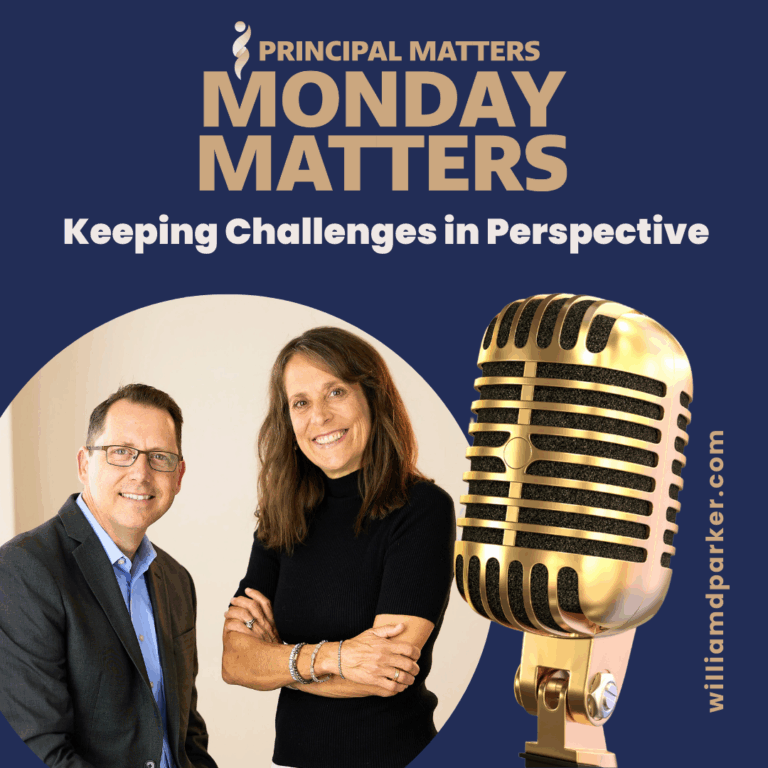Podcast: Play in new window | Download
Recently, my twelve-year-old son, Jack, and I took a long road trip from Oklahoma to West Tennessee to visit my parents.
Gran and Grandaddy live in the country–so far out they receive no cell service. It was a weekend of being unplugged. It was also a weekend to be reminded that my life is more than just school leadership. We took long walks to see turning leaves and rambled through the deep woods. Jack borrowed Gran’s shovel and dug out an old spring down the hill from the house–a spring we used when I was his age.
Time away is a great time to reflect on life. And reflection is an important part of professional growth as well. As I reflect back on the lessons learned in school leadership, my biggest takeaways often come from trial and error. But experience also teaches you some useful steps for moving forward with more confidence.
This week’s podcast is a replay of a webinar I shared with principals a couple of weeks ago about three important areas I have reflected on in chapters 9-11 of my book Principal Matters. These takeaways come from lessons learned from my experiences as an assistant principal and principal.
Three Areas to Reflect for Creating Strong School Environments
As school leaders, we manage many responsibilities. Three of them include:
1. How to discipline with dignity
2. Remembering why teachers are so important
3. How to maintain sanity during stressful times
As you think about those three areas in your own school leadership, let me encourage you to listen to podcast version of the webinar for examples in each area for some valuable takeaways.
Part 1: Discipline with Dignity
When you provide the direction and the correction necessary for positive student behaviors, you are creating an atmosphere of learning for all. Here are six tips:
1. Set high expectations.
2. Let consequences fit infractions.
3. Be consistent.
4. Be creative when necessary.
5. Be polite.
6. Be specific and document.
7. Serve and teach.
8. Communicate trust.
Part 2: Why Teachers Matter
Just as important as maintaining a safe and nurturing environment, keep revisiting why teachers play such an important role in the lives of students. In this week’s podcast, I tell the stories of two older men I know who both told me powerful stories of how former teachers spoke into their lives in such a profound way that it changed them forever.
One of them said to me, “Will, I can’t tell you how many times I’ve heard someone tell me a life–changing story by saying, ‘And then I met a teacher, and it changed everything.’”
As you think about your life, ask yourself: what kind of legacy have my own teachers or principals left for me? And then ask: what kind of legacy am I leaving for others? Remind your teachers that as they influence students, they are a part of a mission that lasts far beyond today or this school year.
Part 3: Maintaining Sanity During Stressful Times
School leaders are not exempt from stress, and when you’re facing a time when the list of to-do’s becomes overwhelming, don’t lose hope. You will never do your work perfectly; however, you can remember some tips that can help you stay focused:
1. Keep a sensible schedule (where you can).
2. Accept you’re not always in complete control.
3. Maintain a “to-do” list.
4. Let others know you need help.
5. Keep your work in perspective.
In the webinar version of this presentation, I share some visual case studies on how to strategize during crunch times.
Let’s Wrap This Up
When Jack and I visited Gran and Granddaddy, he heard a lot of stories about my childhood. Later, during our drive home, he said, “Dad, one thing I liked about our visit was being so far away from our ‘normal’ life at home and school.” As I drove on, I thought about how taking a walk down memory lane can sometimes re-introduce you to ideas or practices you can now see with fresh perspective.
Leadership lessons can often be helpful in retrospect too. Whether it is managing student discipline, identifying strong teachers, or maintaining productivity, each of these areas affects the culture of your school. Ultimately, your commitment to creating positive environments in each area will set the tone for learning and growth in your school.
Now It’s Your Turn
What is one positive step you can take this week to increase high expectations for students or teachers about student behavior? How can you recognize and celebrate effective teachers? What is one way you can plan ahead for managing tough moments by having a strong game plan in place?
Sign-Up For Free Updates and Ebook
When you enter your email address here, you will automatically receive my newest posts and a free Ebook, 8 Hats: Essential Roles for School Leaders. Let’s keep learning together!
Principal Matters–The Book!
School leaders are very busy, so each of the twenty-four chapters is designed as a quick-read and followed with take-action questions for follow-up or reflection. If you want practical ideas on understanding your purpose, managing school teams, dealing with challenges, and leading with courage, action, motivation, and teamwork, go HERE to pick up a copy for you or your team.
Messaging Matters
Harness the power of messaging to create a culture of acknowledgment, respect, and celebration. Written specially for leaders, this title is divided into three parts, helping readers to maximize their role as chief communicators with students, teachers, and parents and community. Each chapter includes suggestions for using digital tools to enhance messaging and ends with reflection questions and practical next steps.




